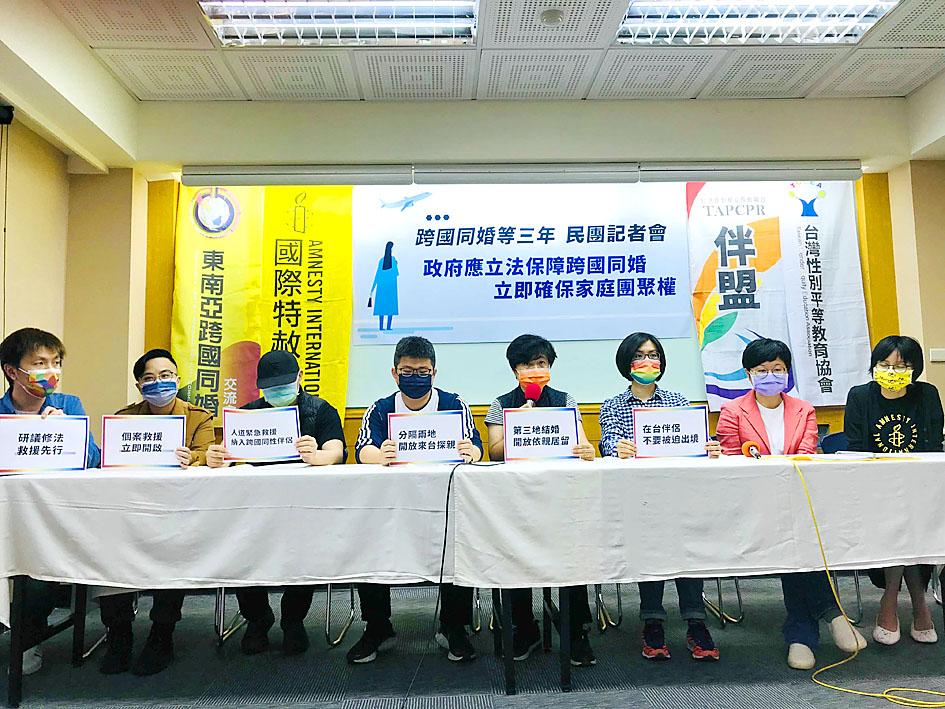Human rights and LGBTQ+ advocacy groups on Wednesday urged the government to expedite a proposed amendment to allow all transnational same-sex couples to register their marriage in Taiwan.
Although Taiwan legalized same-sex marriage in 2019, the Ministry of the Interior has over the past two years followed a directive that prohibits same-sex couples from registering when one partner is from a country or jurisdiction where same-sex marriage is illegal.
The directive cites as its legal basis Article 46 of the Act Governing the Choice of Law in Civil Matters Involving Foreign Elements (涉外民事法律適用法), which stipulates that the formation of a marriage is governed by the laws of each partner’s home country.

Photo courtesy of the TAPCPR
As a result, if one partner in a transnational same-sex couple comes from a country that has not legalized gay marriage, the government prohibits them from marrying in Taiwan and does not recognize a marriage registered in a third country.
Taiwan Alliance to Promote Civil Partnership Rights (TAPCPR) secretary-general Chien Chih-chieh (簡至潔) told a news conference on Wednesday that to resolve the issue, the Judicial Yuan in January last year submitted a proposed revision of the act to the Cabinet for review.
However, 16 months have passed and the Cabinet has made little progress on a draft amendment, Chien said, urging the government to understand the obstacle facing some transnational same-sex couples who wish to get married in Taiwan and speed up the legislative process.
Once the Cabinet approves the amendment, it would send the draft to the Legislative Yuan for review.
Amnesty International Taiwan secretary-general Chiu I-ling (邱伊翎) said that the act in its current form discriminates against gay people of certain nationalities, which is not in line with two UN human rights-related covenants adopted by Taiwan in 2009.
The International Covenant on Civil and Political Rights and the International Covenant on Economic, Social and Cultural Rights contain provisions that guarantee all people protection from discrimination due to race, sex, political opinion, national or social origin, and birth or other status.
The groups called on the government to take immediate measures to ensure the right of transnational same-sex couples to family unions.
The government should allow a foreign national in a transnational same-sex couple married in a third country to use a dependent visa to travel to Taiwan if their partner is Taiwanese or based in Taiwan with valid residency, Chien said.
The government should include transnational same-sex couples with one partner from a country that has not legalized gay marriage in a new measure introduced by the Bureau of Consular Affairs on April 12, Chien added.
The measure allows “relatives” of Taiwanese nationals and foreigners with valid Taiwanese residency to apply to enter Taiwan on a visitor visa.
The bureau measure considers the need and right for family reunions at a time when strict border controls continue to prohibit most foreign arrivals.
The right to reunite and stay together is what concerns transnational same-sex couples the most, Chien said, citing TAPCPR data showing that at least 138 such couples have not been able to be together in person for more than two years because of Taiwan’s border controls.

Chinese Nationalist Party (KMT) Chairman Eric Chu (朱立倫), spokeswoman Yang Chih-yu (楊智伃) and Legislator Hsieh Lung-chieh (謝龍介) would be summoned by police for questioning for leading an illegal assembly on Thursday evening last week, Minister of the Interior Liu Shyh-fang (劉世芳) said today. The three KMT officials led an assembly outside the Taipei City Prosecutors’ Office, a restricted area where public assembly is not allowed, protesting the questioning of several KMT staff and searches of KMT headquarters and offices in a recall petition forgery case. Chu, Yang and Hsieh are all suspected of contravening the Assembly and Parade Act (集會遊行法) by holding

PRAISE: Japanese visitor Takashi Kubota said the Taiwanese temple architecture images showcased in the AI Art Gallery were the most impressive displays he saw Taiwan does not have an official pavilion at the World Expo in Osaka, Japan, because of its diplomatic predicament, but the government-backed Tech World pavilion is drawing interest with its unique recreations of works by Taiwanese artists. The pavilion features an artificial intelligence (AI)-based art gallery showcasing works of famous Taiwanese artists from the Japanese colonial period using innovative technologies. Among its main simulated displays are Eastern gouache paintings by Chen Chin (陳進), Lin Yu-shan (林玉山) and Kuo Hsueh-hu (郭雪湖), who were the three young Taiwanese painters selected for the East Asian Painting exhibition in 1927. Gouache is a water-based

Taiwan would welcome the return of Honduras as a diplomatic ally if its next president decides to make such a move, Minister of Foreign Affairs Lin Chia-lung (林佳龍) said yesterday. “Of course, we would welcome Honduras if they want to restore diplomatic ties with Taiwan after their elections,” Lin said at a meeting of the legislature’s Foreign Affairs and National Defense Committee, when asked to comment on statements made by two of the three Honduran presidential candidates during the presidential campaign in the Central American country. Taiwan is paying close attention to the region as a whole in the wake of a

OFF-TARGET: More than 30,000 participants were expected to take part in the Games next month, but only 6,550 foreign and 19,400 Taiwanese athletes have registered Taipei city councilors yesterday blasted the organizers of next month’s World Masters Games over sudden timetable and venue changes, which they said have caused thousands of participants to back out of the international sporting event, among other organizational issues. They also cited visa delays and political interference by China as reasons many foreign athletes are requesting refunds for the event, to be held from May 17 to 30. Jointly organized by the Taipei and New Taipei City governments, the games have been rocked by numerous controversies since preparations began in 2020. Taipei City Councilor Lin Yen-feng (林延鳳) said yesterday that new measures by